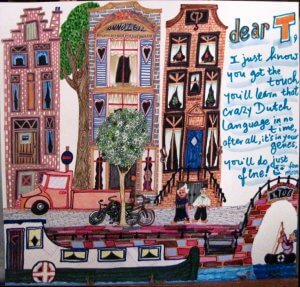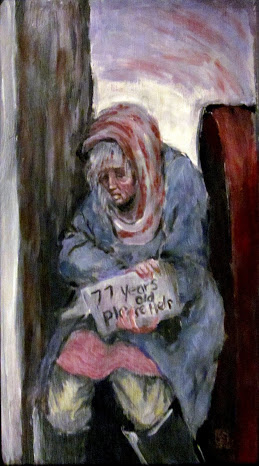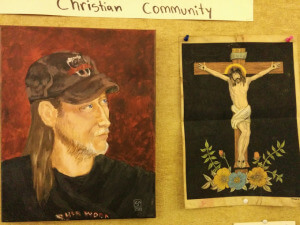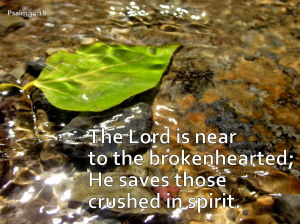-
“Your City Cares”
 It is better for housed neighbors to be comfortable, than a street person to survive.
It is better for housed neighbors to be comfortable, than a street person to survive.It is better for someone to live on the street than in a garage.
It is better for someone to go hungry than to eat non-inspected food.
It is better for someone to die of hypothermia than stay in a church.
It is better to fine someone than give them shelter.
It is better to treat a person like a pile of garbage rather than give them dignity.
It is better to push someone away than to give them a place to be.
It is better to pay a designer for unique benches than to give someone a place to sleep.
It is better to look good than to love.
-
Top Ten Ways To Oppress the Poor
(as expressed by Hebrew Prophets)
 Stealing from the poor (Isaiah 1:17, 23; Jeremiah 5:28)
Stealing from the poor (Isaiah 1:17, 23; Jeremiah 5:28)
Like a city hiring a company to throw away the sleeping gear of the homeless
Refusing to defend the needy (Isaiah 3:14-15)
Like a judge declaring that a city has the right to abuse the homeless
Unjust judgments against the poor (Isaiah 10:1-2)
Like arresting a poor person for being unable to pay a fine they received for being poor
Not assisting the needy (Ezekiel 16:49)
Like reducing welfare to those who really need it.
Taking interest for loans (Ezekiel 18:15-17)
Like “quick cash” companies, or bill collectors.
Enslaving a people (Amos 1:6)
Like incarcerating a quarter of the population of African American males.
Excessive violence in war, especially against innocents (Amos 1:13)
Like sending drones out to destroy whole families, or destroying a city for their government’s actions.
Excessive rent against the poor (Amos 5:11)
Like kicking a poor family out of their apartment because they are late with their rent.
Accepting bribes (Amos 5:12)
Like getting paid overtime for doing “extra police work” by evicting the homeless.
Turning away those who need shelter for a night (Amos 5:12)
Like almost every church in the United States.
I guess if Amos or Isaiah came today, they’d be pretty busy.
-
A Dangerous Book
 A rich man’s wealth is his strong city, And like a high wall in his own imagination.
A rich man’s wealth is his strong city, And like a high wall in his own imagination.
The sleep of the working man is pleasant, whether he eats little or much; but the full stomach of the rich man does not allow him to sleep.
The rich man is wise in his own eyes, But the poor who has understanding sees through him.
Proverbs of Ancient Hebrew writings, also known as Proverbs 18:11; Ecclesiastes 5:12; and Proverbs 28:11
Good morning, my brothers. I am honored that you have chosen me to speak to you, the All-Wealthy Fathers Under Liberty, for I have been concerned about our plight for some time. We have been subjected to oppression long enough! (Cheers in the crowd.) I was shocked last week to hear Brother Steven’s speech on hate crime in motion pictures. Up until this point, I have enjoyed the James Bond movies—but no more. Now I understand that they are simply anti-rich propaganda, intended to throw suspicion upon the good brothers who have worked hard to obtain their wealth. How dare they make Dr. No or the other villains wealthy? All of them? Clearly, just as our brother has pointed out, it is simple prejudice and jealousy! (More cheers.) I thank Brother Arnold for his insider’s view and especially for his work in banning these films, as well as any others which portray the wealthy according to stereotypes, instead of the truly honorable men we are. Let the media put the specter of suspicion where it belongs—on the government and the poor! (More cheers.) Let us bring back more wholesome programming, such as Schindler’s List and The Millionaire! (More cheers.)
As serious as the prejudice found in movies is, there is yet another, more insidious cultural influence that we must be concerned about. Movies and magazines, television and newspapers, and, of course, the internet—all have their various forms of prejudice and oppression against the rich and all need to be influenced, such as our Brother Rupert, Brother Ted and Brother Bill have done. But there is another, greater influence that has been all but overlooked. There is a medium that has been influential, not just for decades, a century or a century and a half, but for millennia! It has been used by the enemies of the rich, oppressing us and destroying us since time immemorial! It is the cause of many of the wars against the rich—The Lombard uprising of the 1400s in England, the Thirty Years War in Germany in the 1500s, and it is still used as a primary inspiration of the Marxists in Latin America today! And while you may think that these events are too out of touch with our current structure, I need to inform you that this medium—this dangerous piece of literature—is in the majority of homes in the United States. Right now. And many of you have read this book, yea, even quoted this book. By now, you have probably guessed what I am speaking about, but you dare not say its name, nor even think it. Yes, that’s right, I am speaking of the Bible—the New Testament in particular.
Perhaps some of you are ready to stand up and speak against me now, because I am speaking ill of a book that you hold so dear. Perhaps some are ready to walk out on me, because much of your wealth—the very reason you are here—has come in part because of your talent in speaking on this particular book. I do not begrudge your use of it, Brothers—especially our dear Brother Robert and Brother Benny. I appreciate your skill and tact in opening this book and carefully directing the thoughts of those who read it. You religious leaders have been essential to our cause, and our most important supporters! You have succeeded to make wealth popular and important among your people with greater success than any of us have! We thank you for your work! (Scattered clapping throughout the hall.) But we must also recognize how dangerous this book is.
The Bible is a complex and multi-faceted piece of literature. It is sixty-six different books, written by a variety of authors over at least a thousand years. Their perspectives vary, as do the issues they discuss. With this, there is much for anyone to expound upon with safety. There are examples of wealthy people who are heroes in this collection of scrolls—Abraham, Jacob, Boaz, Job, Solomon and Esther. However, even these are marginal victories. Abraham and Job are seen as righteous, not because of their wealth, but because of their generosity, faith and sacrifice. Boaz is righteous for assisting a poor, illegal immigrant. Solomon is famous for his wisdom, but ultimately rejected for his disobedience of God’s law and idolatry. Esther is of an oppressed racial minority, which is the real focus of her story. And Jacob is displayed as obtaining his wealth through deceit and the power of God, and suffering greatly in his later life because of his trickery early in his life.
In the Old Testament, where all of these stories take place, there are dangerous themes that crop up now and again. We have a sympathetic woman, gaining a child after praying for so many years, saying, “The weapons of the powerful are cast down and the weak take up strength.” One of the many psalmists say, “Better is the little of the righteous than the wealth of the wicked.” In the book of Proverbs it says, “Give me neither poverty nor wealth, lest I become arrogant and say, ‘Who is God?’” Another psalmist says, “These are the wicked who have increased in wealth.”
In the prophets of the Old Testament, the danger to us increases. Ezekiel says that the sins of Sodom is that the city was wealthy and arrogant, refusing to help the poor and needy. Jeremiah says that the wealthy in his day became so because of deceit. Micah claims that the rich of his day were “full of violence”. Of course, this is blatant prejudice, painting all the wealthy with the same stroke.
Nevertheless, the Old Testament is not problematic overall. None of these passages must be thought of as speaking of the rich in general. While there seems to be a theme—especially that of obtaining wealth through violence and deceit—it is not consistent, and we can avoid such pitfalls by our Bible-brokers speaking of these cases as being rare, while most wealthy are good and right before God.
The real problem comes in the New Testament. This is a revolutionary text, and I do not mean that positively. It is speaking from the perspective of the disorderly elements of society, those that disrupt the proper flow of economics and authority. As many of us well know, it is within this tome of subversive writers that we have a few passages that support the lower classes being in submission to the upper classes—and this is as it should be. However, it is always spoken of in the context of the upper classes oppressing and harming the lower classes. The New Testament has nothing good to say about us, brothers.
Let us take, for example, a brief letter to various churches, written by the brother or cousin of Jesus, James– or perhaps by his students. James was an important figure in the early church and his word was considered law by many groups of this fledgling— but revolutionary— religious movement. He had much to say about us, my brothers—and none of it was good. Listen to this: “The poor brother should be glad for his high position, and the wealthy should be glad for his lowly position, for even as a flower in bloom will soon fade and become ugly, so will the rich man fade away in the midst of his pursuit of wealth.” Again, listen to this: “God chose the poor of this world to be rich in faith… but it is the wealthy that drag you into court and oppress you.” (A few gasps in the midst of a shocked silence.) But this is not all. This so-called “just” James dares to make yet another, more horrible, even more prejudicial remark. This is difficult for me to read, and it is extremely shocking, so please be prepared for it: “Weep and howl, you rich, for your miseries are coming upon you. Your riches have rotted and your garments are destroyed. Your gold and silver have rusted, and its rust is a witness against you in God’s judgment. The laborers you have hired are crying out against you for you have withheld their wages and it will be heard by the Lord of the harvest. You have lived… luxuriously on earth…” I’m sorry, I’m trying… “and you have… fattened yourself for the day of slaughter.” (Stunned silence fills the hall.)
I hope you are outraged as much as I am. This is blatant hate speech. It is more forthrightly prejudiced against us than almost anything I have ever heard or read, except perhaps that despicable song by Aerosmith. And if it was only in the letter of James—which our Brother Martin Luther called a “right straw epistle”—then perhaps it could be bearable. The book is small, it could be avoided.
But who can avoid Jesus? Yet Jesus says, “Woe to you who are rich for you have already received your comfort! Woe to you who are well fed, for you shall go hungry! Woe to you who are entertained now, for you shall weep!” It is Jesus who says, “No one can serve two masters, either he will love the one and hate the other. No one can serve both God and wealth.” It is Jesus who says, “Sell all your possessions and give to the poor, and then you will have treasure in heaven.” It is Jesus who says, “None of you can be my disciple unless you renounce all of your possessions.” It is Jesus who says, “You say ‘I am wealthy, I have need of nothing,’ but you do not see that you are poor and blind and wretched and miserable and naked.”
Clear lies, all of them! Our God could not despise us, who has blessed us so?
Do you not see? The real enemy of our cause in this so-called Holy Writ is not James, but Jesus himself. It is Jesus that enacted the change that turned the Bible from a humble critic of the excess of the unrighteous rich to an attack on all of us! These terrible, poor-loving, deceptive words, in blatant opposition to the equality of rich men everywhere were spoken by the founder of the Jesus movement himself! I know that many of you scholars might be saying, “Well, Jesus may not have said that,” or, “there are certainly other interpretations.” Of course there are. Of course there are doubts. But the clear reading of the text is impossible to deny when brought all together.
Allow me to repeat a couple main points. This book is dangerous. It works directly against our cause, and influences the simple minded to be prejudiced against the wealthy. Secondly, this book is in the majority of American homes! There are people who read from this book daily! Worst of all, there are many who actually believe this book to be God’s own Word and so might very well believe what it says.
Now, we know, Brothers, that God supports us and our cause—let there be no question about that. God has granted us our wealth and so wants us to rule the world and influence the people with it. And so God has given us a commission—we must subvert the clear meaning of this book. It is a book filled with despicable lies that will tear down the fabric of our very society. And so we must continue the work accomplished so boldly by our forefather Thomas Jefferson. We must discourage the reading of this book as much as possible. If the masses are to read anything, let them read the relatively safe Old Testament.
Even better, we must follow in the ways of our Muslim brothers and claim through our media that both New and Old Testaments have been superseded by greater, better, teaching. The best, most popular teaching are the new ethics based upon scientific principles. This allows us to support an ethics that are based on positive, capitalistic principles. In this way, the hate speech may be muted, and we will regain our former glory and honor that we deserve to have.
I see my time is up. Thank you for your rapt attention, brothers. (Wild applause breaks out.)
-
Balance
 So, I’ve been having some bad days.
So, I’ve been having some bad days.I’ve been resting, which is good, but it hurts. I’ve had cramps, headaches, diarrhea, deeper depression, and a growing sense of failure. Most of this is because of adrenaline withdrawal, which often hits people who overwork and then stop suddenly. I know that I work a lot, too much. But I’ve been feeling that I want to return to overworking if this is how I feel at rest.
This is a minor symptom of my lifestyle, really. There are greater ones:
A hormone imbalance over the last decade.
Social instability as I do not fit in one culture or another.
Lack of control over my emotional state.
My family and I living in poverty for the last fifteen years.
Neighbors, police, and the violent screaming at me.
Threats and fines from the city.
Of course, my friends and family, who really love me, don’t like this at all. Everyone, including myself, would like to see me live a life of greater balance. God made us all to exist in a world of balance, of shalom, where we would have our needs met, the rest we need, positive companions and emotional strength to love.
My friends see that I am choosing not to live in that shalom, even though it is within my reach. They tell me to rest more, to take more breaks, to eat better, to participate in more joy, to write more, to spend more time with God. I have friends who tell me that I cannot save the world, that I am doing too much, that I need to delegate, that perhaps I should quit. After all, my health is at stake, and my family’s well-being.
The solution, of course, is simple. I just need to back off. I just need to say “no”.
I need to say “no” to the man who comes to me thirsty, when I have much to drink.
I need to say “no” to the woman who is hungry, when I have a cupboard and refrigerator full of food.
I need to say “no” to the family who is harassed and unable to sleep, even though I have a safe place where they can sleep.
I need to say “no” to the mentally ill, who just me to give them comfort.
I need to say “no” to those who have no opportunity for worship, and to not give them an opportunity to come before the Lord.
I need to say “no” to those who want to tell me their long story, to refuse to listen so that I cannot pray for them.
I need to say “no” to the sinner and the outcast, refuse to give them a place of safety.
My well-being is more important than saying “yes”. My health is more important than theirs. My rest is more essential than theirs.
 The problem is that we do not live in a world of balance. If everyone lived balanced lives between work for ourselves and work for others, if we all lived out compassion and mercy, if we all gave people the benefit of the doubt and the kind of grace that God gives us all, if we all took our extra resources and shared with those in need around us, then we would have a world of shalom. But that’s not the kind of world we live in. We live in a world where criminals are punished, not rehabilitated. We live in a world where the poor are rejected and treated like garbage. We live in a world where cultural, ethnic and social differences result in poverty and death. We are far from the balance God created.
The problem is that we do not live in a world of balance. If everyone lived balanced lives between work for ourselves and work for others, if we all lived out compassion and mercy, if we all gave people the benefit of the doubt and the kind of grace that God gives us all, if we all took our extra resources and shared with those in need around us, then we would have a world of shalom. But that’s not the kind of world we live in. We live in a world where criminals are punished, not rehabilitated. We live in a world where the poor are rejected and treated like garbage. We live in a world where cultural, ethnic and social differences result in poverty and death. We are far from the balance God created.Because of this extreme imbalance, some must love more to make up for that. Because some do not have ample food or drink or clothing, others must give so that they might survive. Because most do not share of their wealth, some must share more, even out of their poverty. Because most do not offer grace, some must open their arms in welcome all the more. Because too many labor for little return, some must labor more so that they may rest.
It isn’t fair. But it is the way of Jesus.
Jesus healed the masses, even when balance required that he rest. Jesus walked hundreds of miles to go to those who had need. Jesus offered food out of his poverty. Jesus counselled in the middle of the night, and rose up early to pray. Jesus made himself a target to the authorities so that some might rest. Jesus surrendered his life so that others might live.
And Jesus told his followers that we are to live the same kind of life. “No one has greater love than this, that a man lay down his life for his friends.” “Sell your possessions and give to the poor.” “Deny yourself, take up your cross and follow me.” “Surrender all that you have.” “Go from town to town, heal the sick, cast out demons, raise the dead and proclaim the kingdom.” “Blessed are you who are poor.” “Blessed are you when men speak ill of you.” Jesus wasn’t a great advocate of a life of balance.
The reward for this is that which cannot be seen. Jesus promises that a life of sacrifice and persecution due to love will have joy, but also mourning. That we will have a community of support amidst persecution. That we will have our needs met amidst poverty. And that we will have lives of comfort and peace and balance in a future time that is beyond our current resources. This is why this is called a life of faith. Because sacrificial love is for a pleasure that cannot be touched or even perceived with our senses.
If you live a life of balance, I do not begrudge you that. Good for you, as long as you give to those in need. In fact, know that I am a bit jealous of you. I wish that I could live a life of balance. But that is not my purpose in life.
Some think that I am trying to save the world. I am not so delusional. All I am trying to do is to help the person in front of me. And the next one. And the next one. To provide just a teeny bit more balance, a bit more shalom, in this world than when I came to it. If that means that if my health, my economics, my emotional state, my social standing or my life suffers because of it, then I just have to trust that God will make it worth it all.
-
Crushed
So I took Yvan to her physical therapist this afternoon and was waiting for her in the Lobby. Next to me is a lady in her 80s, humming to herself some little catchy tune. Her therapist comes out and greets her and asks her how she is doing? “A few more sessions and I’ll dance a jig” and she shuffles/dances down the hall to her appointment.
Out comes another
 therapist and calls out a name and this woman in her 40s comes out from behind her tabloid and the first words out of the lady’s mouth are “What are you smiling about?” No matter how the therapist attempted to cheer her patient the patient refused to be cheered and told the therapist to be quiet and lets get this over with. I could see that the therapist was taken aback by the rebuke as the middle aged woman stomped off down the hall.
therapist and calls out a name and this woman in her 40s comes out from behind her tabloid and the first words out of the lady’s mouth are “What are you smiling about?” No matter how the therapist attempted to cheer her patient the patient refused to be cheered and told the therapist to be quiet and lets get this over with. I could see that the therapist was taken aback by the rebuke as the middle aged woman stomped off down the hall.
So I stepped up and took the therapist arm and she turned and looked me in the eye and I could see tears beginning to well up. “It is not your fault,” I whispered, “you did nothing wrong. Do not own the rebuke. Her anger came here with her. It is the fruit of unforgiveness.”
A smile flickered across her face and the whisper of “Thanks” escaped her lips and off she went to deal with her patient.
In Romans 15 it says that we who are strong need to bear with the scruples of those who are weak, but sometimes we need to come along side our brethren who are dealing with the weak for the words of the weak are pointed and poisoned. Like the therapist these words can find the gaps in the armor and prove deadly. We then who are stronger then need to step up and strengthen our brethren and sisters to and minister the oil needed to affect healing and release encouragement.
3733 N Williams Ave
Portland, OR 97227
503.888.4453
AnawimCC@gmail.com
Ministry Locations and Times »










